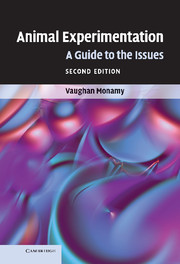Book contents
- Frontmatter
- Contents
- Preface to the second edition
- Acknowledgements
- 1 Issues in animal experimentation
- 2 A history of animal experimentation
- 3 Opposition to animal experimentation
- 4 The moral status of animals
- 5 Animal use
- 6 The regulation of experiments
- 7 Seeking alternatives
- 8 Conclusions
- Ethical guidelines for students in laboratory classes involving the use of animals or animal tissues
- References
- Index
5 - Animal use
Published online by Cambridge University Press: 05 June 2012
- Frontmatter
- Contents
- Preface to the second edition
- Acknowledgements
- 1 Issues in animal experimentation
- 2 A history of animal experimentation
- 3 Opposition to animal experimentation
- 4 The moral status of animals
- 5 Animal use
- 6 The regulation of experiments
- 7 Seeking alternatives
- 8 Conclusions
- Ethical guidelines for students in laboratory classes involving the use of animals or animal tissues
- References
- Index
Summary
Where there is no scientifically and morally acceptable alternative, some use of animals in biomedical research can be justified (albeit by different moral reasons for different people) as necessary to safeguard and improve the health, and to alleviate the suffering, of human beings and [other] animals; as well as to advance fundamental scientific knowledge, upon which such therapeutic and practical benefits might depend. Such a justification, however, should be considered very carefully indeed.
Smith and Boyd (1991, p. 329)HOW ARE ANIMALS USED?
At the end of Chapter 2, I listed some of the numerous medical advances that have been made through research involving animals. It is not just the field of medicine in which such strides have been made and it is worthwhile to consider more fully the extent to which animals are used.
FUNDAMENTAL AND APPLIED BIOLOGICAL RESEARCH
Fundamental, or pure, research aims to advance knowledge without having specific aims, such as an improvement in human and non-human health, in mind. Francis Bacon (1561–1626) eloquently described such research as experimenta lucifera, or ‘experiments which shed light’. In contrast, experimenta fructifera described ‘experiments which yield fruit’ (Paton 1993). Today's term for goal-directed experimentation is ‘applied research’. In practice, pure and applied research are often inextricably linked. Fundamental investigations often result in practical applications while applied efforts often lead into new areas of fundamental research.
- Type
- Chapter
- Information
- Animal ExperimentationA Guide to the Issues, pp. 58 - 63Publisher: Cambridge University PressPrint publication year: 2009



